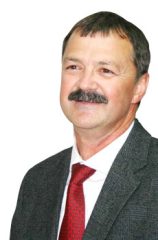In conversation with
Mr. Johan Steyn
MD | Aerosud Aviation (Pty) Ltd

FDI Spotlight: Aerosud has partnerships with Boeing and Airbus. Do they hold you to any exclusivity conditions to work only with them?
Mr. Johan Steyn: Apart from confidentiality and contractual requirements there are no limitations. The parts that we manufacture for those companies are single source OEM parts supplied to them, but there’s no limitation on who we can work with. Most figures in the industry believe that it’s better to have a well-distributed customer base than solely rely on a small number of big companies. There’s always cross-pollination. Companies are competitors one day and collaborators the next.
The Department of Trade and Industry (DTI) states that the biggest challenge facing the aviation industry is a lack of large-scale collaborative development. Do you agree? What needs to be done?
Mr. Johan Steyn: I do not believe that one flagship project or product can change an industry. We do not believe that having ‘flagship’ status is the key issue. Positioning a new product in the face of competition will always require careful analysis and strong leadership to execute, and probably in a niche market, to be successful. Looking at the SA landscape, one can also find strong reasons for growth in the advanced manufacturing sector, within the international commercial aviation market.
There are around 50 companies in the commercial aviation manufacturing space in South Africa. There are around 15 that are more active than the others. We are the biggest one. Taken together, we form CAMASA (Commercial Aviation Manufacturing Association of South Africa). Collectively, we export around R 2.5 billion in commercial aviation products annually. 40 % of these products are value added. Compare that with the motor industry, which is less than 20 %.
We are advocating what we call a ‘bilateral growth partnership’ between CAMASA and the DTI. We have already invested about R 2 billion in this industry. We are self-sustained. So, what if we set a target to double this industry in five years? Let’s make that the flagship. Let’s make a collaborative effort between all major stakeholders to grow the commercial aviation manufacturing industry this way.
We often quote the example of the Moroccan industry. In 2000, they started off with a strategic bilateral agreement between Boeing and Safran (then Labinal). This produced a company called Matis, which is still active today. But the wider effect was to create an industry that is ten times bigger than the South African industry. They don’t have a flagship. What they have are lots of products and an understanding of the strength of focused interventions like this.
How do you promote an innovation driven ecosystem and incorporate innovation into your day-to-day activities?
Mr. Johan Steyn: We directly support our suppliers. We develop supply chains, giving resources and training to the ten or so companies we actively work with. We’ve helped three of them get their own independent Airbus approval in the last five years. We don’t require that they work exclusively with us, just that they apply anything we teach them to improving their work for us. This approach has the ability to empower the entire industry, boosting suppliers and creating stimulating competition.
We realise that in South Africa getting the supply chain into companies is a challenge. Raw materials are highly regulated and specified. So we manage our own logistics — 40 % of what we sell we have bought in ourselves. It’s difficult due to our location on the southern tip of Africa, but we take it on ourselves to ensure specifications are met.
We have something of an exclusive agreement with DSV, the logistics company. We work with them on imports when we want full control over the products, and on most of our exports. This could be a future opportunity for the industry— net purchase and net logistics.
When we talk about innovation and Industry 4.0, many industry leaders associate this with job losses, how do you incorporate progress for innovation whilst continuing to empower your human capital?
Mr. Johan Steyn: You’re right, many leaders automatically attached a distrust to something that they don’t fully understand. The reality is quite the opposite. We believe in this new paradigm so strongly, that we are sponsoring and hosting a number of events and symposiums with strategic partners to create awareness and remove the stigma attached to advanced manufacturing. I think it’s vital that stakeholders throughout the economy and members of the public get a true perspective from the leaders who live the reality of Industry 4.0. These new systems and parameters that are being implemented not only improve efficiency and accountability, but can also help improve our team’s working experience and foster benefitiation. The fact is that Industry 4.0 is already affecting our day-to-day lives. From speaking to some of my German partners they have said that Industry 4.0 will likely lead to the loss of 1.5 million jobs across the German manufacturing sector, however they are also confident that it will create at least 1.5 million new jobs which we don’t even have titles for yet. When progress is being made in any walk of life, there is always going to be fall out from the bottom, but with the opening up of new exciting areas at the top, we can use our new skills to help bring everyone forward together.
This integration of the value chain frees you up to focus on adding value and diversifying. How do you prioritise diversification, and what does it mean for the future of Aerosud?
Mr. Johan Steyn: Take as an example our work on 3D printing and titanium beneficiation. It’s a long-term objective, probably another five to ten years away, but we know there’s going to be something there. Our objective isn’t necessarily to print parts, but to design and integrate them. This is a technology direction that we will continue to diversify in.
Last year we signed an MOU with Ethiopian Airlines. They are probably the most successful airline on the continent. We are quite excited about the opportunity to leverage business through them. They’re unique among airlines, with one business unit focused on developing aviation manufacturing capability in Ethiopia. Aerosud have indigenous know-how and skills that can be of direct relevance to the Ethiopians in setting up and operating a low to medium volume production facility – and grow from there. We believe that such a collaborative program can unlock opportunities for both countries and the region at large. From a diversification point of view, it’s probably the boldest thing we’ve ever tried to do.
We have got to get out of the old South African mindset. You have to have international markets. We do, but we still need to grow them. We have to find the right mixture of incentives for the industry.
What is your message of confidence to prospective new partners and clients from our readership around the world?
Mr. Johan Steyn: South Africa and the South African engineering fraternity are traditionally very innovative. We seek to exploit, in the positive sense, that innovation with long-term strategy and strategic partnership. You cannot have a short-term view in this business. That’s why we are focused on commercial aviation manufacturing, as it is more stable. The essence of a successful partnership is to take a long view, and not to stifle our industry with too much red tape. Allow some innovation to filter through.
With your partnerships with your suppliers and the growth projected for Aerosud over the next few years, what does it mean for you to be able to empower the South African people within your workforce?
Mr. Johan Steyn: We have 400 people in our production department, making aircraft parts every day. Roughly 180 are artisans, the other 220 are operators. We have 100 high-end design engineers in our company, and 30 % of our production staff are female. Around 40 % are black. These things happened naturally. The average age of our aviation staff is 35. This only happens when you train young people.
Not long after the company was founded, we started a formal artisan-training program. We do these training initiatives as a matter of priority. We have the ability and ambition to grow that, especially in the transport domain. Empowerment of young people is only one of many transformation initiatives the company is embracing.
